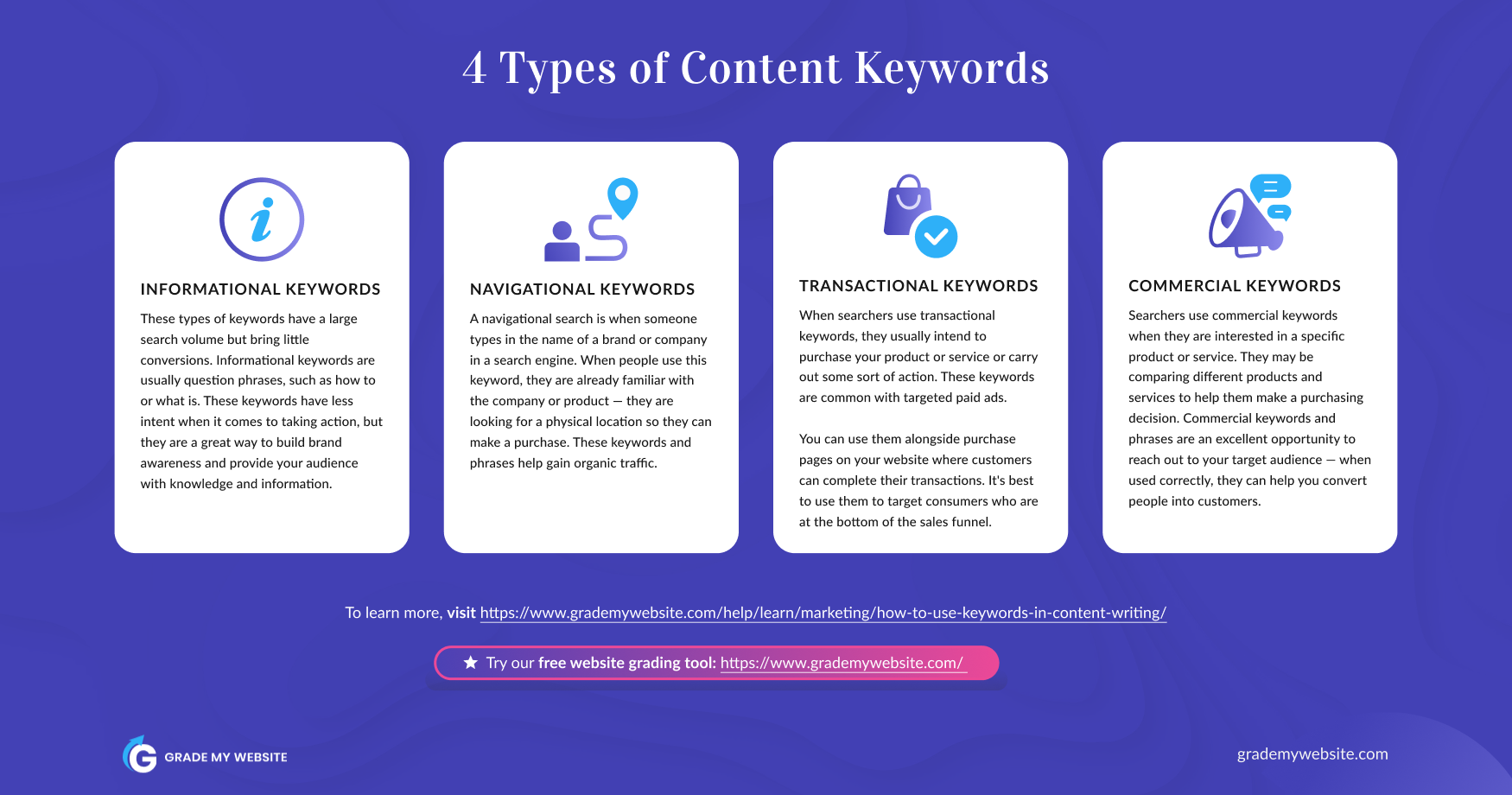How To Use Keywords in Content Writing?
In this guide, we’ll talk about how to use keywords in content writing. Keywords are essential for content — they tell search engines what is in your content and whether it is relevant to searchers. While stuffing your content with as many keywords as possible may be tempting, this tends to do more harm than good. Your content needs to read naturally, making it enjoyable and enticing for your target audience.

What are content keywords?
Content keywords are words and phrases that describe what a piece of content is about. Searchers type these words and phrases into search engines when they are looking for information. These keywords lead them to the content that is related to their search. The keywords you use make your content visible to searchers and give them the answers they seek.
There are four main types of content keywords:

1. Informational keywords
These types of keywords have a large search volume but bring little conversions. Informational keywords are usually question phrases, such as how to or what is. These keywords have less intent when it comes to taking action, but they are a great way to build brand awareness and provide your audience with knowledge and information.
2. Navigational keywords
A navigational search is when someone types in the name of a brand or company in a search engine. When people use this keyword, they are already familiar with the company or product — they are looking for a physical location so they can make a purchase. These keywords and phrases help gain organic traffic.
3. Transactional keywords
When searchers use transactional keywords, they usually intend to purchase your product or service or carry out some sort of action. These keywords are common with targeted paid ads.
You can use them alongside purchase pages on your website where customers can complete their transactions. It’s best to use them to target consumers who are at the bottom of the sales funnel.
4. Commercial keywords
Searchers use commercial keywords when they are interested in a specific product or service. They may be comparing different products and services to help them make a purchasing decision. Commercial keywords and phrases are an excellent opportunity to reach out to your target audience — when used correctly, they can help you convert people into customers.
5 tips on how to use keywords in content writing
You need to use your content keywords effectively to make your content stand out from others. Avoid stuffing your content with phrases that make your content read awkwardly. These five best practices will help you use keywords effectively in your content.
1. Write down a list of possible keywords
Start by creating a list of topics that are relevant to your business. This list will be a general selection to which you can add keywords. Consider your audience and think of what topics may be relevant to them — what topics will they be searching for that you want to get found for?
Once you have your topics, it’s time to add your keywords and phrases. Consider what keywords are important to rank for in search engine results pages (SERPs) — these are the phrases your target audience uses to conduct their online searches.
2. Do keyword research
When creating your list of keywords, look at the related search terms that appear in the results when you search your topic or keyword. These associated terms can help you expand on what people are searching for and spark more ideas for keywords in your content.
There are plenty of online tools that you can use to build on your list of keywords and phrases. Keyword research tools and SEO tools can help you find exact match keywords and phrases based on the list you have already created.
3. Use keyword mapping
Many websites use keyword mapping to arrange their keywords and phrases. Keyword mapping is the practice of planning your keywords to match the unique content on each website page.
Instead of loading your pages with keywords, focus on what makes each unique. You can then choose the relevant keywords and phrases for each page to make them stand out from one another.
The keywords you use must align with the content on the page — imagine users searching for a term and clicking through to your page only to find that the content does not match what they are looking for.
4. Strategically place your keywords in content
So, where do you insert keywords in your content? There are a few best practices and strategic places where you should place your keywords in your content:
- Meta title tag: When searchers look through the SERPs, your meta title tag is the first thing they will notice, so it holds a lot of authority. Your page title must be relevant and compelling enough to entice readers to click on your article. Search engines also use the meta title tag to analyze what your page is about and use it for ranking. Ideally, you should use your primary keyword in your title tag.
- Meta description: The meta description gives search engines and searchers a preview of your content. It is a 160-character snippet that appears in the SERPs when people post a query related to your page. Writing a powerful meta description with one or two keywords can help you earn more clicks on your content.
- Headings: Large chunks of uninterrupted text are intimidating for readers, which is why having a page title and using headings throughout your content makes it easier for people to read. Headings are also crucial for SEO. Including key phrases in your headings can help improve your ranking.
- Body text: Including the right amount of keywords in your content is essential for ranking and improving your visibility in the SERPs.
5. Prioritize your readers
When inserting your keywords, consider whether your content reads naturally. Stuffing your content with keywords can compromise your content and your audience’s ability to engage with it. Search engines can easily pick up on nonsensical content that is stuffed with keywords, which will only hurt your page’s ranking.
Improve your website’s visibility with Grade My Website
Content keywords and phrases help search engines understand what your page is about and rank it in the SERPS. They also help searchers understand what your content is about. When choosing keywords for your content, it’s essential to do your research and have an effective strategy for using them.
As a full-service digital marketing agency, we create custom content for our clients, helping them rank for relevant keywords online. Get in touch with us today to learn more!
Google Maps SEO: 10 Tips to Rank Higher on Google Maps
What is Google Maps SEO? Google Maps SEO (search engine optimization) is the process of making your business visible on Google Maps when users search for related keywords to your business. As an internet user, you have likely done a Google search to find a local store selling the product you’re looking for near you. […]
Read moreHow To Check Google Ranking?
Learning how to check Google ranking lets you know how much exposure your website receives for specific keywords. Checking your website’s Google ranking may help you identify areas of strengths and weaknesses you can improve on to rank higher on the SERPs and boost your return on investment (ROI). Read on for more information about […]
Read moreWhat Is Google EEAT and How To Optimize Your Site?
Over the years, digital marketers have determined the key elements that produce a high-ranking webpage. But little is known about the Google algorithm that puts webpages at the top of the SERP. However, Google has provided helpful guidelines to ensure quality pages match user intent. Explore what Google EEAT is and what you can do […]
Read moreHow To Add Google Analytics to WordPress?
Google Analytics is one of the most efficient web analytics tools offered by Google for businesses and individuals who want statistics on a specific website’s performance. Further to this, it provides you as the site owner with data on visitor insights such as how they access the site, the channels they use, top keywords used to […]
Read more